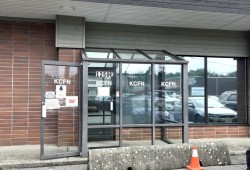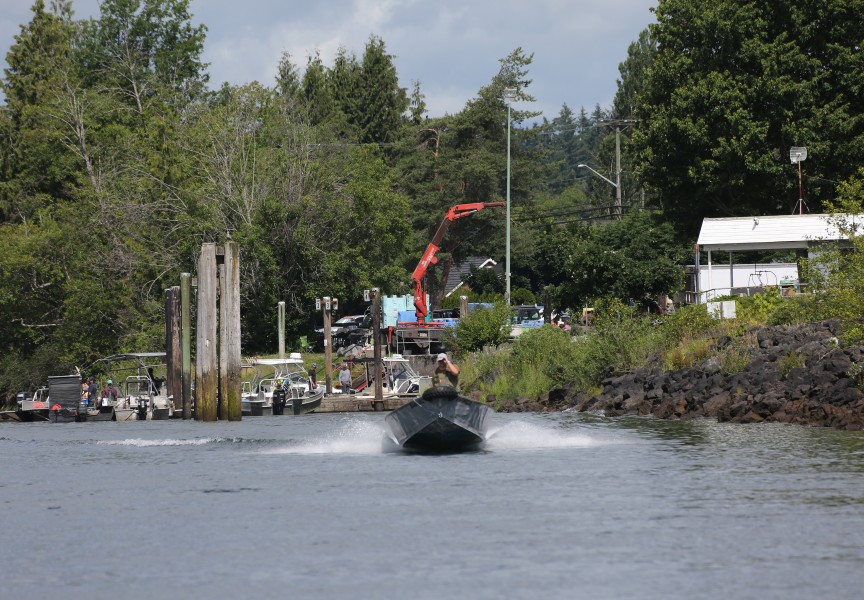The economic arm of a Nuu-chah-nulth First Nation is now calling the shots at its headquarters.
That’s because Tiičma Enterprises recently purchased the Campbell River building which had been serving as the home for the group of businesses as well as the administrative offices of the Ka:'yu:'k't'h'/Che:k'tles7et'h' First Nations (KCFN).
Tiičma Enterprises owns a number of businesses in various industries including forestry, fisheries, aquaculture, hospitality, tourism, property management and management services.
“It also allows us to use the building more freely,” said Kari Sullivan, the general manager of Tiičma Property Services LP, which is the property management arm of Tiičma Enterprises. “So, if we want to make changes to it, we can. We don't have to go through a landlord to get requests. It also allows the nation to own it and have an asset…for generations down the road.”
The building, located at 1250 Ironwood Street in Campbell River, was previously owned by Nanaimo-based Noort Investments Ltd.
Sullivan said the building, which was purchased for slightly more than $5 million, had been eyed by KCFN officials for years.
“What happened was we asked the previous owner in the past to sell it and they didn't want to move on it,” she said. “And then we requested it again. And they said, well, maybe in five years when our lease was up.”
That lease expired this year and the deal was struck.
“In a way, because we're the biggest tenant of the building, perhaps they kind of looked at it and thought what if we left,” Sullivan said, although she noted that Tiičma Enterprises officials did not threaten to move out of the facility. “Then they would have this massive building without any people in it. So, that could've been one of the reasons why they reconsidered the sale.”
Sullivan speculated on another possible reason why Noort Investments opted to sell the facility now.
“It's also a northern building for them,” she said. “And being down in Nanaimo, it made sense for them to sell it to us because we're here. We became the anchor tenant. If we were to pull out, they would have had a lot of space empty.”
Gary Wilson, KFCN’s director of economic development who is also the CEO of Tiičma Management Services LP, is also pleased a deal was finalized to buy the building. The purchase brings “certainty around not having to worry whether or not the former landlord or a new landlord come along and change the scope or focus of the facility, and then forcing us to find a new residence,” he said. “So, we now have certainty that that won't happen.”
Wilson also said the objectives of KCFN’s economic corporation are to create opportunities for the nations to be sovereign, generate revenue and provide opportunities for Ka:'yu:'k't'h'/Che:k'tles7et'h' citizens to work.
“So, owning real estate is diversifying our assets beyond our other businesses we own,” he said. “And so that helps us build equity and be able to leverage that equity, to acquire either additional assets like it or even expand.”
Though there is no timeline when that might happen, Wilson said KCFN officials could one day jump into the clean energy industry.
“But we need it for expanding our businesses to grow to build infrastructure and to grow our businesses. We need that additional power. So, there's potential for us to get involved in clean energy.”
Kyuquot’s electricity comes from a privately-owned company that purchases power from the BC Hydro grid and resells it to the First Nation’s remote community. There is a single cable feeding the electricity to the village and it is at capacity.
While Tiičma Enterprises appears to be moving forward in positive directions, Wilson said the group of businesses, like others around the world, has been feeling the effects of tariffs implemented by the current U.S. administration.
Wilson added Tiičma’s tourism and hospitality businesses have taken some hits, as have operators globally.
“The folks that usually spend their money to go further afield, their discretionary income is shrinking with the inflation and the uncertainty around their jobs and the economy,” he said. “Folks are spending probably less than they would normally spend.”
He added people around the world are more money conscious now.
“Globally there's an impact because of the uncertainties around the world,” he said. “I don't know the specific numbers locally.”
Wilson added other Tiičma businesses, including its forestry one, could be affected soon by decisions made in the U.S.
If tariffs threatened by the U.S. government are implemented this summer, Canadian lumber could taxes of 34.45 per cent when entering the American market, according to the B.C. premier’s office.
“We are in the middle of getting prepared for a (forestry) project in this late fall/early winter,” he said. “We’re not exactly sure what those prices will look like. There are tariffs and on top of that the other trade barriers that we have in trading south and around the world.
“Our biggest customer is the American consumer. So, of course, that's going to have an impact. We don't know the effects directly as of yet, because those are still in flux and still negotiations going on.”
For now, Wilson believes it was a prudent decision to buy the Campbell River facility.
“In terms of this building what we're trying to do is build equity into the businesses that we acquire or partner on,” he said, adding that those can then be leveraged for expansion, supporting small businesses locally in the territory.
But he doesn’t have a crystal ball to know what will happen with possible future projects.
“If we're acquiring assets and equipment from the south, the prices may be prohibited,” he said. “With development, there’s supply chain issues that could potentially have an impact. We have no plans for that in the short term because we're trying to manage the existing businesses at this point.”








